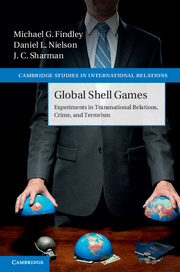Book contents
- Frontmatter
- Dedication
- Contents
- List of Figures
- List of Tables
- Preface
- 1 Introduction
- 2 Explaining the global shell game
- 3 Overall compliance, tax havens, OECD and developing countries
- 4 Terrorism and corruption
- 5 Laws and standards
- 6 Penalties, norms, and US origin
- 7 Conclusion
- Appendices
- References
- Index
Appendices
Published online by Cambridge University Press: 05 June 2014
- Frontmatter
- Dedication
- Contents
- List of Figures
- List of Tables
- Preface
- 1 Introduction
- 2 Explaining the global shell game
- 3 Overall compliance, tax havens, OECD and developing countries
- 4 Terrorism and corruption
- 5 Laws and standards
- 6 Penalties, norms, and US origin
- 7 Conclusion
- Appendices
- References
- Index
Summary
General Background
Data on the corporate service providers were collected from April 2010 to June 2011. Email communication with all of the service providers occurred between March 2011 and July 2012. As discussed below, we carried out the overall project in multiple stages and the results from each stage are pooled together.
We carried out the experiment with the help of a large group of research assistants (RAs) at Brigham Young University. The group’s size l uctuated with up to seven RAs working on the project during the busiest times and as little as one working on it between waves of the experiment. A total of 25 RAs (11 women and 14 men) worked on the project over a period slightly longer than two years. One RA worked on the project for a year and a half, but RAs generally worked on the project for an average of four months before leaving the project to graduate, study abroad, accept other employment, or return home for the summer.
Dustin Homer and Brock Laney each led the research team at different times. Research team members included: Allyson Adams, Jessica Allred, Lauren Barden, Peter Carroll, Drew Chapman, Zach Christensen, Stephanie Dowdle, Madeleine Gleave, Dano Gunderson, Matt Hadley, Ben Haymond, James Juchau, Diana Kunakaeva, Robert Morello, Catie Nielson, Brian Reed, Wayne Sandholtz, Tara Simmons, Megan Spencer, Deborah Sutton, Brittany Thorley, Dane Thorley, and Danny Walker.
- Type
- Chapter
- Information
- Global Shell GamesExperiments in Transnational Relations, Crime, and Terrorism, pp. 179 - 225Publisher: Cambridge University PressPrint publication year: 2014

